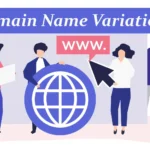In the digital age, a domain name is more than just an address—it’s a powerful asset. Whether you’re buying or selling a domain, knowing how to evaluate its value is crucial. But domain valuation isn’t as simple as checking the price tag on a piece of real estate. There are multiple factors to consider, from market trends to specific characteristics of the name itself.
Whether you’re a business owner looking to acquire a new domain or a domain investor seeking to profit from a sale, understanding how to evaluate a domain name’s value can make all the difference. Let’s walk through the key elements that determine what a domain name is worth and how to assess its potential.
1. Domain Length
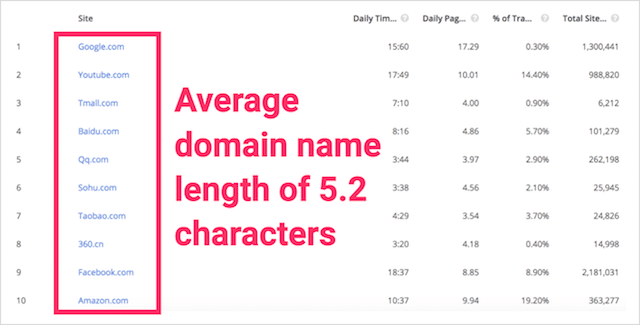
Why It Matters:
The length of a domain name is one of the most straightforward factors in determining its value. Shorter domain names are generally more valuable because they are easier to remember, quicker to type, and often have higher brand recall. Long and complex domain names are harder to brand and less likely to be used by customers or businesses.
The Sweet Spot:
- 1-3 characters: Highly desirable for their brevity, though rare and often expensive.
- 4-6 characters: The ideal length for most domains, striking a balance between memorability and keyword potential.
- 7 or more characters: These are typically less valuable unless the domain includes a strong brand name or highly searched keyword.
Example:
- A domain like
books.comis worth considerably more thanonline-books-for-sale.comdue to the simplicity and ease of recall.
2. Keyword Relevance
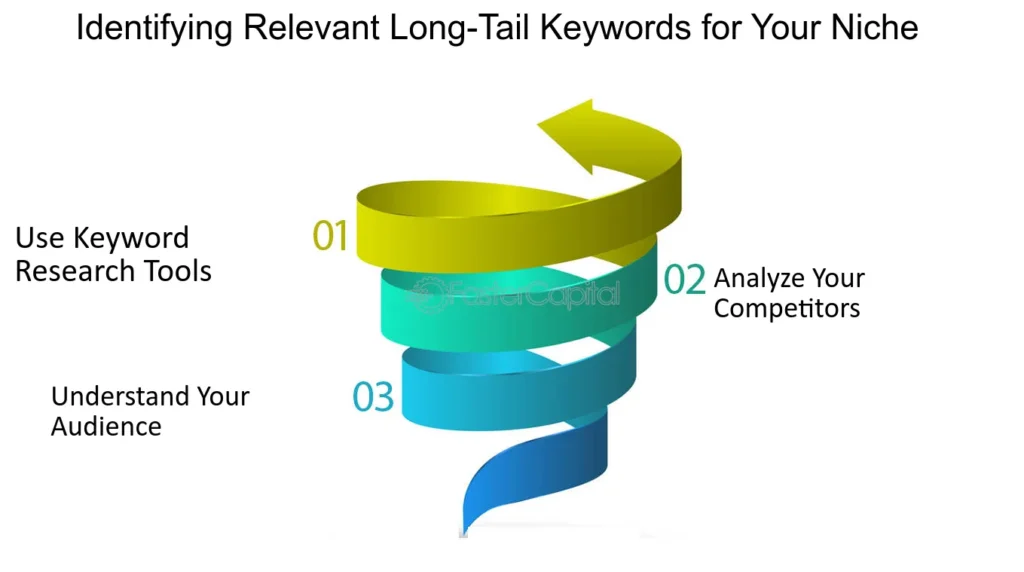
Why It Matters:
A domain name that includes a relevant keyword for a specific industry or niche can greatly increase its value. Domains that match common search terms are more likely to rank well on search engines and have natural traffic. For instance, if your domain contains a popular keyword, it could give businesses an advantage when it comes to SEO.
The Power of Keywords:
- Exact match domains (EMDs): Domains that perfectly match a keyword (e.g.,
bestcomputers.com) are often in high demand. - Partial match domains: These domains may include a keyword but also have some other element (e.g.,
bestlaptopsstore.com). - Brandable names: Unique names without any obvious keyword, but designed to be catchy and memorable, still hold value but aren’t reliant on keyword ranking.
Example:
- A domain like
shoes.comwill likely be more valuable thanfashion-shoes-guide.comdue to the direct, high-traffic potential linked to the keyword “shoes.”
3. Domain Extension (.com vs. Others)
Why It Matters:
The .com extension is by far the most recognized and trusted domain extension, and it often carries the highest value. People instinctively type .com when looking for websites, and search engines tend to favor them. However, other extensions like .net, .org, and newer TLDs like .io, .ai, or .tech may still hold value, but they’re often worth less than a .com domain.
Ranking of Domain Extensions:
- .com – The most valuable and sought-after domain extension due to its global recognition and trust factor.
- .net – Traditionally used by tech companies and internet service providers, though not as valuable as .com.
- .org – Often associated with nonprofits or community-driven organizations.
- Country Code Domains (ccTLDs) – Extensions like .co.uk (United Kingdom) or .de (Germany) hold value within their respective countries but are less marketable globally.
- New TLDs (.io, .ai, .tech, .xyz) – While becoming more popular in certain industries (especially tech), they’re usually less valuable than traditional extensions.
Example:
travel.comwill likely be far more valuable thantravel.coortravel.io, even though all are related to the travel industry.
4. Brandability and Memorability
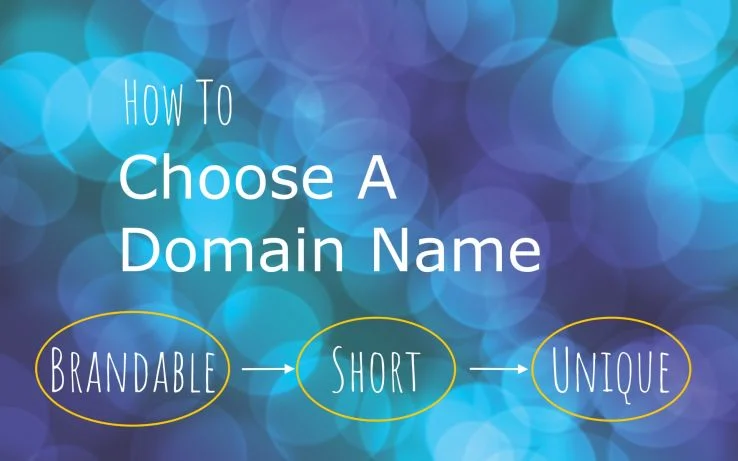
Why It Matters:
A highly brandable domain can be incredibly valuable. If the domain name is catchy, easy to pronounce, and spell, it’s likely to hold more value. This is especially true for short, unique, and memorable names that have the potential to stand out in the market.
Key Aspects to Consider:
- Simplicity: A domain that is easy to spell, pronounce, and remember is much more valuable.
- Avoiding Hyphens and Numbers: Domains with hyphens (e.g.,
cool-shoes.com) or numbers (e.g.,cool1shoes.com) tend to be less valuable since they are more difficult for people to recall. - Marketability: A domain that can easily be transformed into a brand name or marketing slogan will have greater long-term value.
Example:
- A domain like
GiantShoes.comis more valuable thanBest-Value-Shoes.combecause it’s more memorable and easy to brand.
5. Traffic and Existing Backlinks
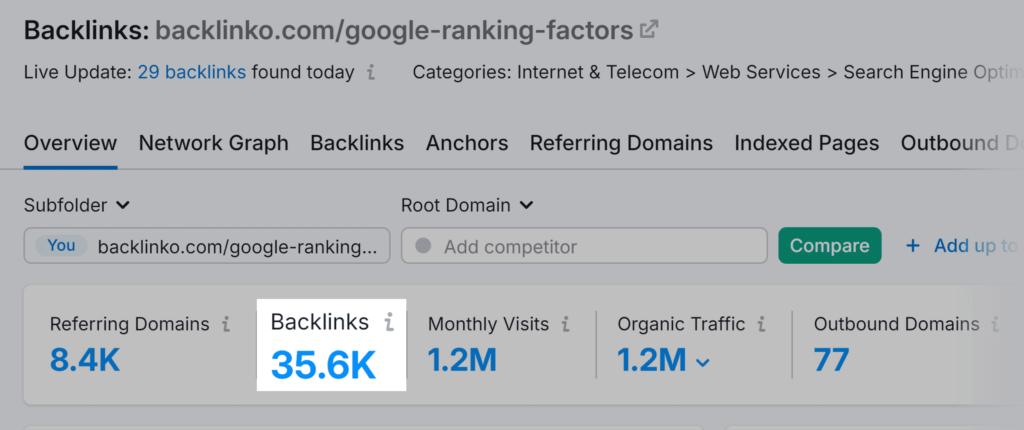
Why It Matters:
A domain name that already receives organic traffic or has an established history of backlinks can be worth considerably more. Websites with pre-existing search engine rankings, regular visitors, and strong backlinks often have immediate value because they don’t require as much work to build up traffic or authority.
How to Evaluate:
- Google Analytics: Check if the domain has consistent traffic from organic search.
- Backlink Profile: Use tools like Ahrefs or Moz to assess the strength of the domain’s backlink profile. A domain with high-quality backlinks from reputable sites will generally have a higher value.
Example:
- If a domain like
HealthyFoodRecipes.comalready has substantial backlinks and is ranking for popular keywords, it could be worth much more than a newly registered domain without any traffic or SEO history.
6. Domain History and Age
Why It Matters:
The age of a domain can play a role in its value. Older domains tend to have better domain authority with search engines and are often considered more trustworthy. Additionally, if the domain has a clean history (i.e., no history of spam or penalties), it will be more valuable.
Key Considerations:
- Age: Generally, domains that have been around for several years tend to carry more weight.
- Clean History: Domains that have been penalized by search engines or have been used for spam could lose value.
- Expired Domains: Sometimes, domains that have expired or been put up for sale can be purchased at a low price and then resold for profit, but this often depends on their historical value.
Example:
vintagecars.comwould likely have a higher value than a newer domain likebestclassiccars.com, due to its age and established history.
7. Market Demand
Why It Matters:
Even the best domain name won’t be valuable unless there’s demand for it. Just because a domain fits the criteria of being short, memorable, and keyword-rich, it’s still essential to gauge how much interest there is in the market for that particular domain.
How to Evaluate:
- Comparable Sales: Research similar domain sales using tools like NameBio to see what domains with similar keywords or characteristics have sold for.
- Industry Trends: Stay updated on trends in the tech, business, or digital space to assess whether a domain has future demand potential. Domains related to emerging industries like artificial intelligence, cryptocurrency, or sustainable energy may be more valuable than others.
Example:
- A domain like
bitcoinwallet.comis far more valuable during the height of cryptocurrency adoption than it would have been when Bitcoin first launched in 2009.
8. Legal Considerations
Why It Matters:
A domain name that violates trademarks or intellectual property rights can lose its value or even lead to legal disputes. Therefore, checking the legal standing of a domain is crucial in assessing its real worth.
Key Aspects to Check:
- Trademark Search: Make sure the domain name doesn’t infringe on existing trademarks by searching databases like the U.S. Patent and Trademark Office (USPTO) or international equivalents.
- Avoiding Brand Confusion: Be cautious of domain names that could be confused with existing brand names, as these could potentially face legal challenges.
Example:
- A domain like
NikeShoes.commight seem valuable, but it’s likely infringing on Nike’s trademark and would carry legal risks.
Conclusion: How to Maximize a Domain’s Value
Evaluating a domain name’s value requires a combination of objective factors (e.g., domain length, keyword relevance) and subjective judgment (e.g., brandability, market demand). As you can see, there is no single metric that determines how much a domain is worth. Instead, you need to consider a wide range of factors—each contributing to the potential price tag of a domain name.
If you’re buying or selling a domain, consider these key points:
- Research domain history and traffic
- Look at keyword relevance
- Understand current market trends and demand
- Factor in the brandability and uniqueness of the name
By understanding these factors, you can more accurately evaluate a domain name’s potential and make better decisions, whether you’re negotiating a sale or acquiring an asset.


